Pot pancakes? Cooking with cannabis and what could be on Canada's menu
Cannabis food products aren't for sale yet, but entrepreneurs already preparing for legalization of edibles
Chef Cody Lindsay whips pancake batter while an intrigued crowd watches. He adds whole wheat flour and oats to give the mixture a healthy boost.
"It's just small improvements to your diet that will help you feel better," he tellsthe audience at a recent cooking demonstration inToronto.
Then comes the final ingredient one not typically found in pancakes a few doses of cannabis oil.
"Now, we know that each pancake is going to have a least onemillilitre of THC," Lindsay says.
Canada doesn't allow the sale of marijuana food products, even for medical use, but individuals who have a prescription formedical marijuana can cook with cannabis at home. And some businesses hope the day will come when they can tap into the lucrative pot edibles market.
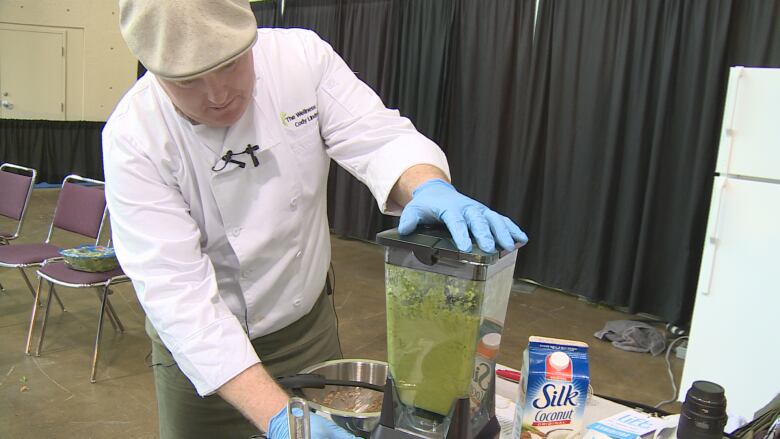
Lindsay, a 32-year-old Canadian war veteran, uses medical marijuana to treat anxiety he developed during a rough tour in Afghanistan.
Also a trained chef, he says he wants to help other medical marijuana users, especially fellow veterans, cook with cannabis in nutritional ways.
"To go one step further and incorporate it into their diet within healthy foods, it's just an added bonus," saidLindsay. "You know, cannabis and salad do mix."
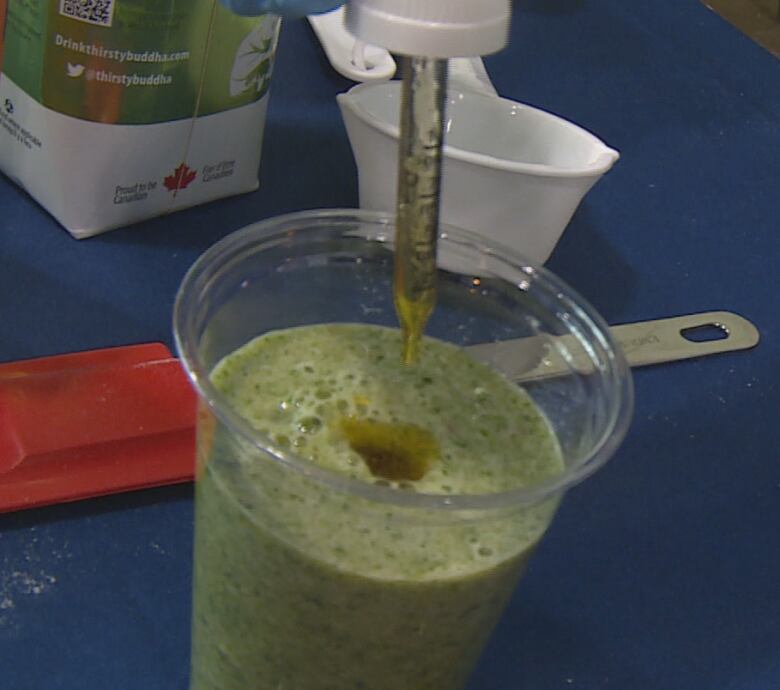
He would like to sell some of his cannabis creations, perhaps even open a marijuana-themed restaurant. But for now, Lindsaysticks to selling his new cannabis cookbook, which features healthy recipes for everything from salad dressings to smoothies to risotto.
No edible salesfor now
Recently, the Supreme Court of Canada ruledthat medical marijuana userswere not limited to smoking the dried plant and could consume pot.
In response, Health Canada allowed licensed medical marijuana companies to produce and sell cannabis oil for medical use.
Some companies expect thatin time, they will be allowed to sell cannabis food items as well.
Already, Victoria city council is exploringamedicalmarijuana business bylaw that would permit the sale of ediblepot products.
The expectedlegalizationof marijuanain Canada next year could also expand the edibles market to recreational users.
- Federal marijuana legislation to be introduced in spring 2017, Philpott says
- Victoria drafting bylaw to allow edible pot products
- Canadian company's marijuana-infused coffee pods ready for brewing
In U.S. states like Colorado, where marijuana is legal, the edibles business is booming.
Lindsay says eating cannabis is preferable to inhaling it for non-smokers and those craving a more steady high.
"You can feel it throughout your system, but it's not giving you a heavy head high, wherein 45 minutes, you'll feel burned out," he said.
If the ediblesmarket opens up in Canada,Lindsay plans to keep hisbusinesssmall, but othershave big ambitions.
Licensed medical cannabis producer CannTrust in Vaughan, Ont., has already applied for approval to make pot-infused single-serve coffee pods.
Tweed's sweet ambitions
Another licensed medical marijuana producer,Tweed, has its sights set on candy.
"It's certainly an exciting opportunity," said company presidentMark Zekulin.
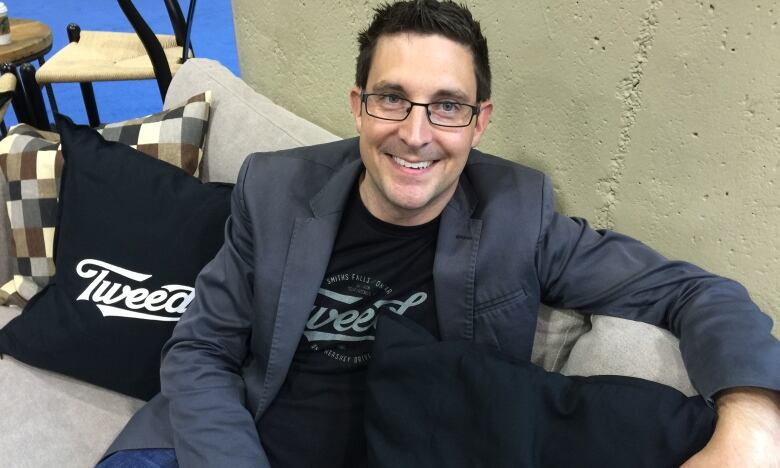
Tweed, which manufactures dried cannabis and oils, has set up shop in the vacated Hershey's chocolate factory in Smith Falls, Ont.
The space is perfect for manufacturinga line of pot-infused chocolates, said Zekulin.
"A lot of the equipment is, in fact, still here," he said.
Zekulin suggests Tweed could consider pot-infused drinks as well.
"As you look ahead to a non-medical market, you could see it sitting beside alcohol in the [liquour store]," he said.
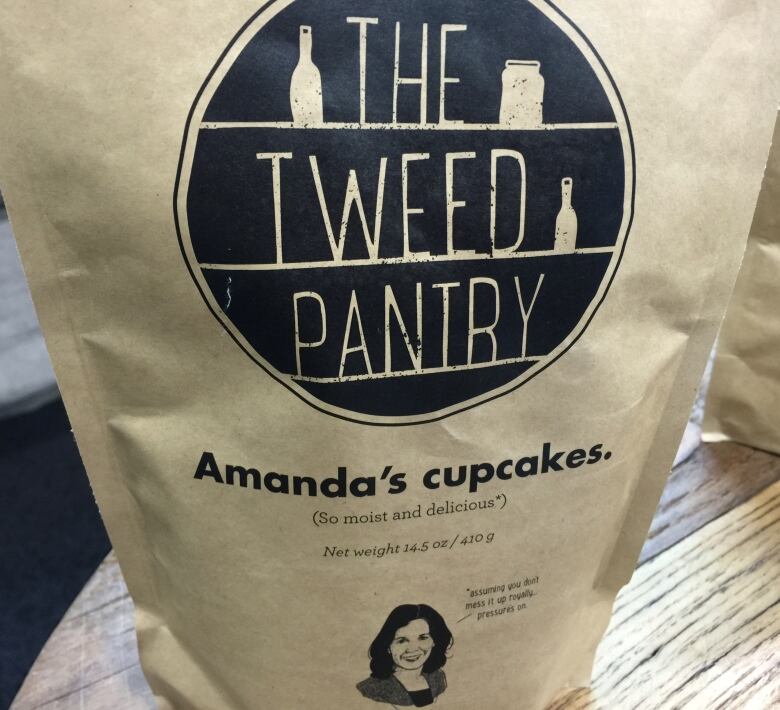
Butfor now, Zekulin must settle for sellingjust the cannabis oil and letting customers do the baking themselves although his company does sell muffin and cupcakemixes.
There are two varieties:gluten-free vanilla andchocolate, and Tweed also has plans for a granola bar mix.
"We tried to pick easy recipes that call for 100 millilitres ofoil. If you make 25 mini cupcakes, you can roughly figure out the dose that you have," explains Zekulin.
Plenty to chew on
Dosing is one of the big concerns with the edibles market. In some U.S. states where pot is legal, there have been reports of increased visits to hospitals because of inexperienced users ingesting too much of the drug often in the form of tasty treats.
Another concern is that the treats will attract children.
Health Canada told CBC News it currently doesn't allow the sale of medical cannabis in food because edible products, brownies and candy in particular, can appeal to young people.
In Colorado, concerns have led to new rules for edibles, including child-proof packaging and improved labels that list ingredients and dosing information.
Zekulin believes the controversy surrounding pot-infused products means Health Canada will proceed cautiously.
"They're open to exploring more, but they really need to understand the data, the risks, how it would work," he said.
Getting a headstart
Canadian company Nutritional High isn't waiting around for a green light.
It plans to soon start manufacturing cannabis-infused hard candies,gummies and chocolates inColorado.
The Toronto-based business is currently building a 11,000-square-foot factory in the state that will churn out the treats with small, controlled doses of pot, says CEO David Posner.
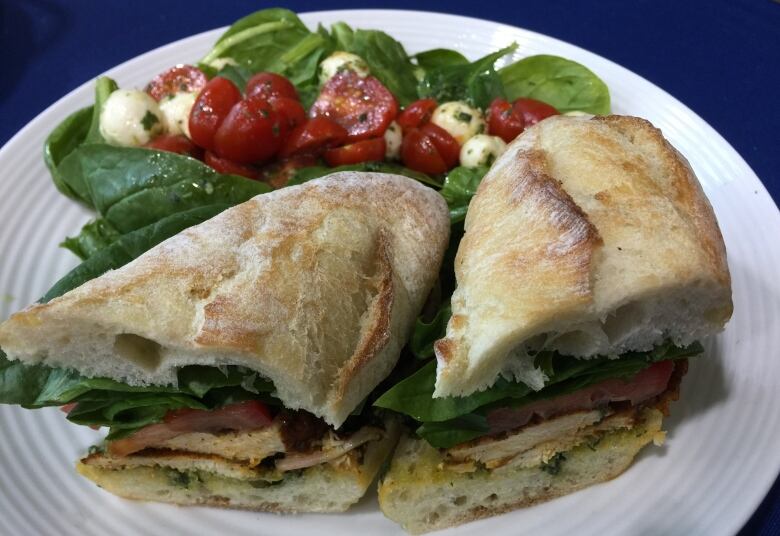
"We only went to the States because it wasn't legal to do it here," he said.
"We wanted to at least get a jump start on what we think is going to be the most profitable and interesting part of the whole industry."
Butfor now, that part of the industry is relegated to cannabis oil and cookbooks in Canada.
That's fine for chef Lindsay. His main mission is to educate patients how to make their own meals.
At his cooking demo, he's now moved on to a chicken pesto sandwich, topped off with cannabis oil.
"If you're going to be taking cannabis in a non-smokable form, eating it is the next best way to go," he tells his audience.
And in Canada, the best way to do that for now is to cook with ityourself.













_(720p).jpg)


 OFFICIAL HD MUSIC VIDEO.jpg)
.jpg)



























































































